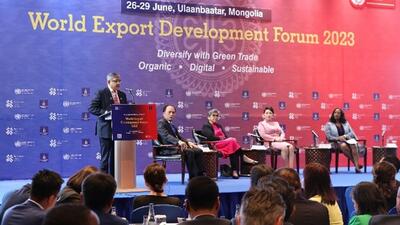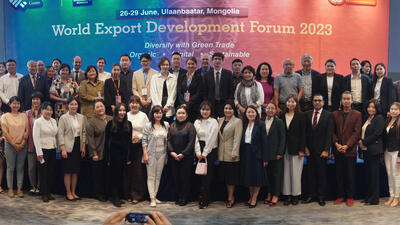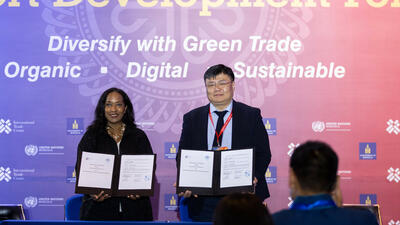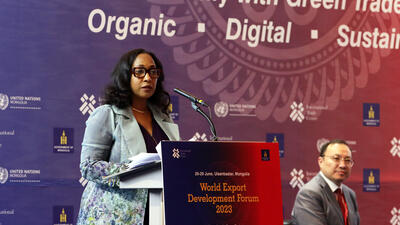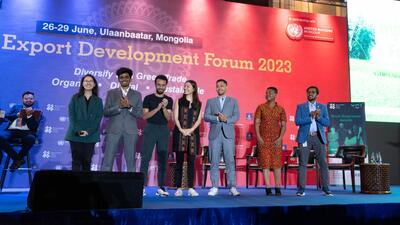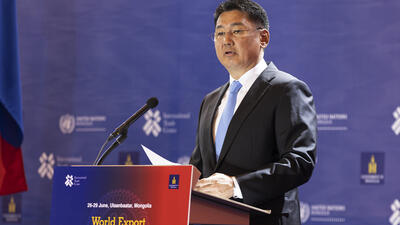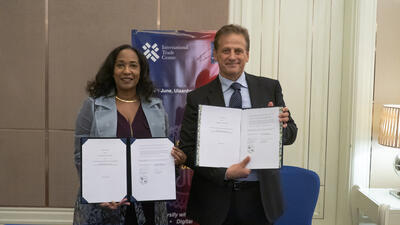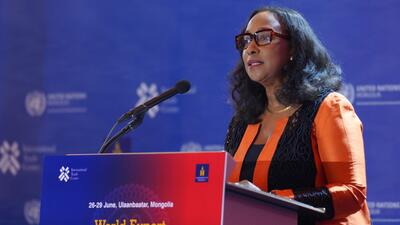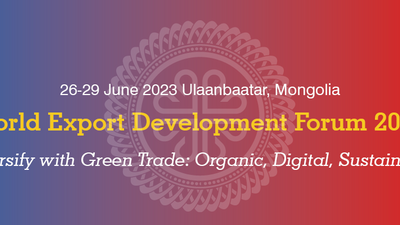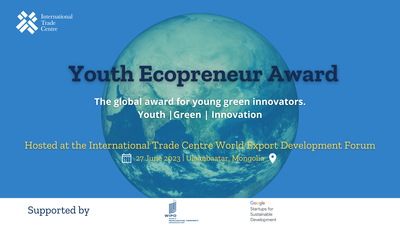


World Export Development Forum 2023: new trade routes are green, digital
The World Export Development Forum returned to the global stage for the first time since the COVID-19 pandemic, with attendees from over 60 countries traveling to Ulaanbaatar, Mongolia from 26-28 June. This 20th edition of the Forum made a powerful statement on what the International Trade Centre’s flagship event can bring to small businesses, international trade, and the wider world of development.
As highlighted by Mongolia’s President, H.E. Khurelsukh Ukhnaa, this year’s Forum came at a time when the climate crisis is at a critical juncture, geopolitical instability confronts the world, and economies are still reeling and reorganizing in the aftermath of a global pandemic. Throughout the week, the World Export Development Forum 2023 spoke directly to these converging crises.
More than 60 thought leaders, experts and inspirational role models took the stage to talk trade and drive development to bring small businesses featuring women, youth and landlocked countries to the forefront of international discourse. Some 600 businesspeople, policymakers and development professionals participated in person, with another 24,000 people joining virtually over livestream.
Trade trends for today
The conference officially opened on 27 June, timed to celebrate the International Day for Micro, Small and Medium-sized Enterprises. Over the course of the Forum, public-private panels discussed trade trends for small businesses – ranging from artificial intelligence to green trade, finance, local innovation, youth entrepreneurship and women in trade.
Some early outcomes
- Hearing businesses in LLDCs. The private sector perspective of landlocked developing countries (LLDCs) emerged during dedicated roundtables on regional connectivity, trade facilitation, finance and development. This dedicated private sector consultation meeting was organized by ITC in partnership with the European Bank for Reconstruction and Development, the Asian Development Bank, the International Think Tank for LLDCs, and the UN Office of the High Representative for LDCs, LLDCs and SIDS (UN-OHRLLS). The outcomes of the conversations feed directly into the 2024 United Nations Conference on Landlocked Developing Countries to be organized by UN-ORHLLS in Kigali, Rwanda.
- To support the discussions, the International Trade Centre published a multimedia report, Transform Your Economies with Connected Services (ICT, transport/logistics, business/professional services and financial services) – with a special section focusing on landlocked countries.
- Supporting women in trade. With the inauguration of the SheTrades Mongolia hub, Mongolia joined a global network of 14 hubs, and is the fifth in Asia. The Hub will be hosted within the Mongolian National Chamber of Commerce and Industry with support from the United Nations Development Programme and the European Bank for Reconstruction and Development.
- Showcasing young, green entrepreneurs. The Youth Ecopreneur Awards drew global attention as seven finalists competed in two categories: Green Business Solutions and Land Restoration Initiatives. The second category is a new addition, developed with the UN Convention to Combat Desertification’s G20 initiative. Oyungerel Munkhbat of Airee, Mongolia and Mashrur Hossain Shurid of iPage, Bangladesh emerged victorious in Green Business Solutions and Land Restoration, respectively. Chirag MG of Sunbird Straws went home with the People’s Choice Award, which was the result of electronic votes from those at the conference as well as those watching online.
The two winners of each category were awarded $5000 each and access to the Google for Startups Accelerator programme. All finalists gained access to intellectual property training programmes from the World Intellectual Property Organization, pitch training from Google and the International Trade Centre, video training from the International Trade Centre, and pro-bono legal services from Sidley Austin until they graduate from SME status.
- Business matchmaking. Reaching out to directly to serve the private sector, B2B meetings focused on three sectors: Leather, Natural Fibres and ICT Services. After a single afternoon of meetings, some $5.2 million in potential business deals, and $6.5 million in investment leads emerged from the 133 participating companies.
B2B meetings were organized in partnership with the Mongolian National Chamber of Commerce and Industry, the European Bank for Reconstruction and Development, the Federation of Indian Export Organisations, and HICOOL. Business outreach and recruitment was made possible through partnership with Eurochamber Mongolia, the American Chamber of Commerce in Mongolia and the Business Council of Mongolia.
Partnerships for lasting change
- National Export Strategy. The International Trade Centre’s support to Mongolia did not end with its closing ceremony. The following day, 130 Mongolian businesses and public sector representatives attended a public-private workshop to kick off the development of Mongolia’s National Export Strategy. Supported by the World Bank, this exercise supports Mongolia’s expressed desire to diversify its exports outside of the traditional mining sectors.
- Business and development partnerships. Partnerships emerged that carry support for Mongolia’s economy and development into the future. For example, ITC signed a Letter of Intent with the European Bank for Reconstruction and Development to collaborate in Mongolia to develop the private sector, focussing on women businesses and entrepreneurs. The Government of Mongolia’s Research and Development Institution of Light Industry signed their own agreement with the Nepal Pashmina Industries Association to collaborate on quality testing and analysis of wool fibres and to exchange knowledge and research.
Participants commented on the ease of networking and dialogue between developed and developing countries, among and between regions, between business and government and between generations.
Sharing a vision to reshape trade
Over the week, the Forum attracted significant social media attention, driving #WEDF to be the most-used hashtag in Mongolia throughout the conference – beating out politics, pop culture, sports and entertainment topics. ITC broadcast the conference on its social media channels in English, and complemented the livestream with session recaps, videos from the ecopreneurs and interviews. The Mongolian government provided a similar stream in Mongolian.
A first analysis of media results shows some 120 editorial mentions from 13 countries, with a potential reach of 350 million readers and viewers.
ITC engaged directly with Trade Finance Global as one of the official media partners for the event, as well as two Mongolian media outlets, Tengerleague and unnu.news, to reach both traditional and young audiences. ITC also organized a media training session with UN Mongolia to sensitize local journalists on why trade matters, to launch its new publication with an accent on landlocked countries, and train journalists on how to use ITC’s trade statistics in their reporting.
Over four days, the 20th World Export Development Forum laid the groundwork for an ambitious, sustainable future of trade – based on a resilient small business sector, a marked shift to green and digital trade, and a greater space for women and young people in business.
Participants were unanimous in highlighting the critical importance of green trade in the face of climate change. They also noted the potential of artificial intelligence to empower small businesses. The conference also celebrated women in business and young entrepreneurs – through the Ecopreneur Awards, and also as speakers in all panels throughout the event. Overall, this year’s Forum brought together experts, business leaders, policymakers and development professionals to address pressing challenges of the day and set an ambitious precedent for what the International Trade Centre and its partners can achieve.
More Info:
- Conference photo Album
- Conference videos including interviews, session recaps, and full session recordings.
- ITC on Linkedin and Facebook









